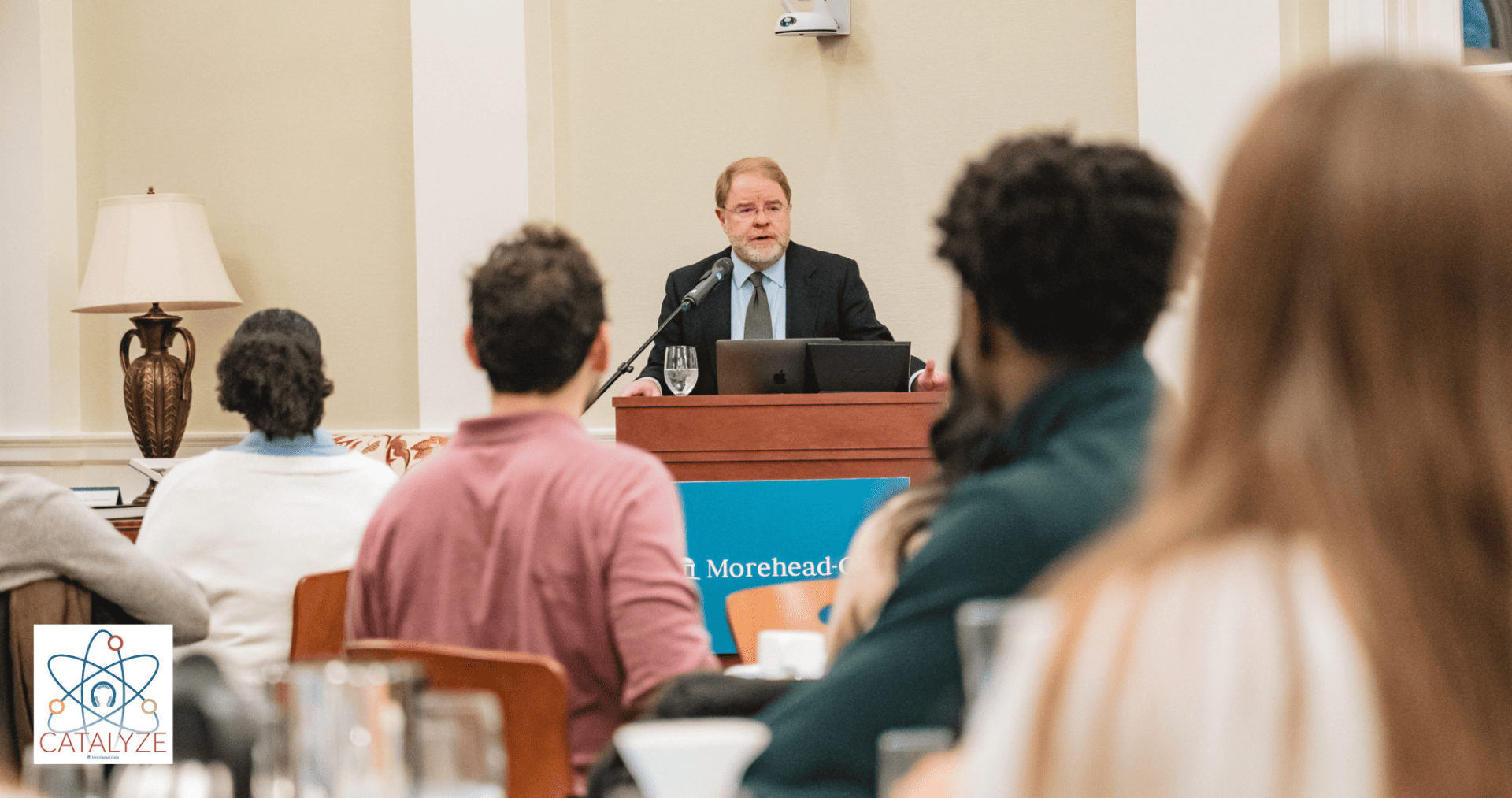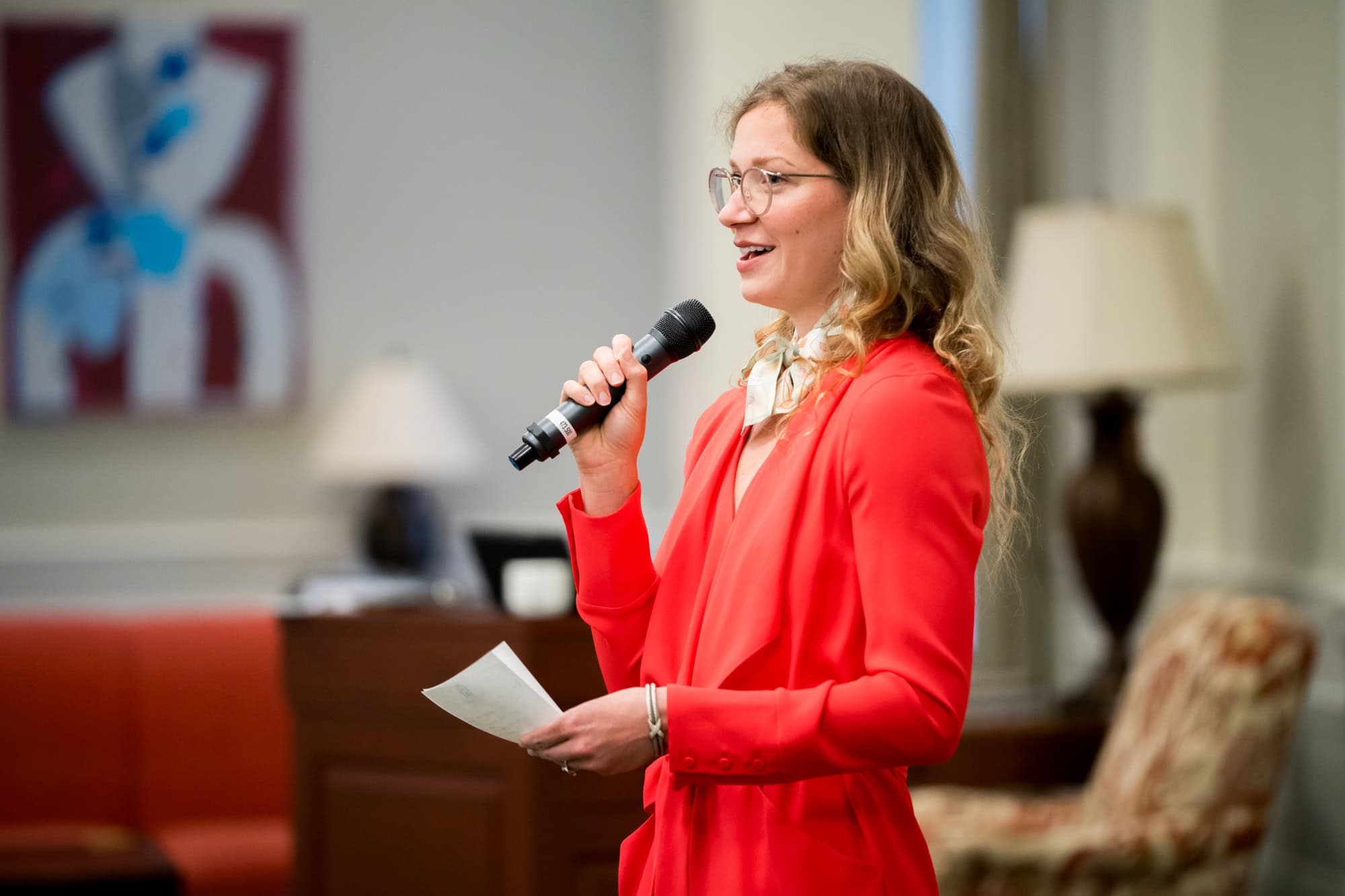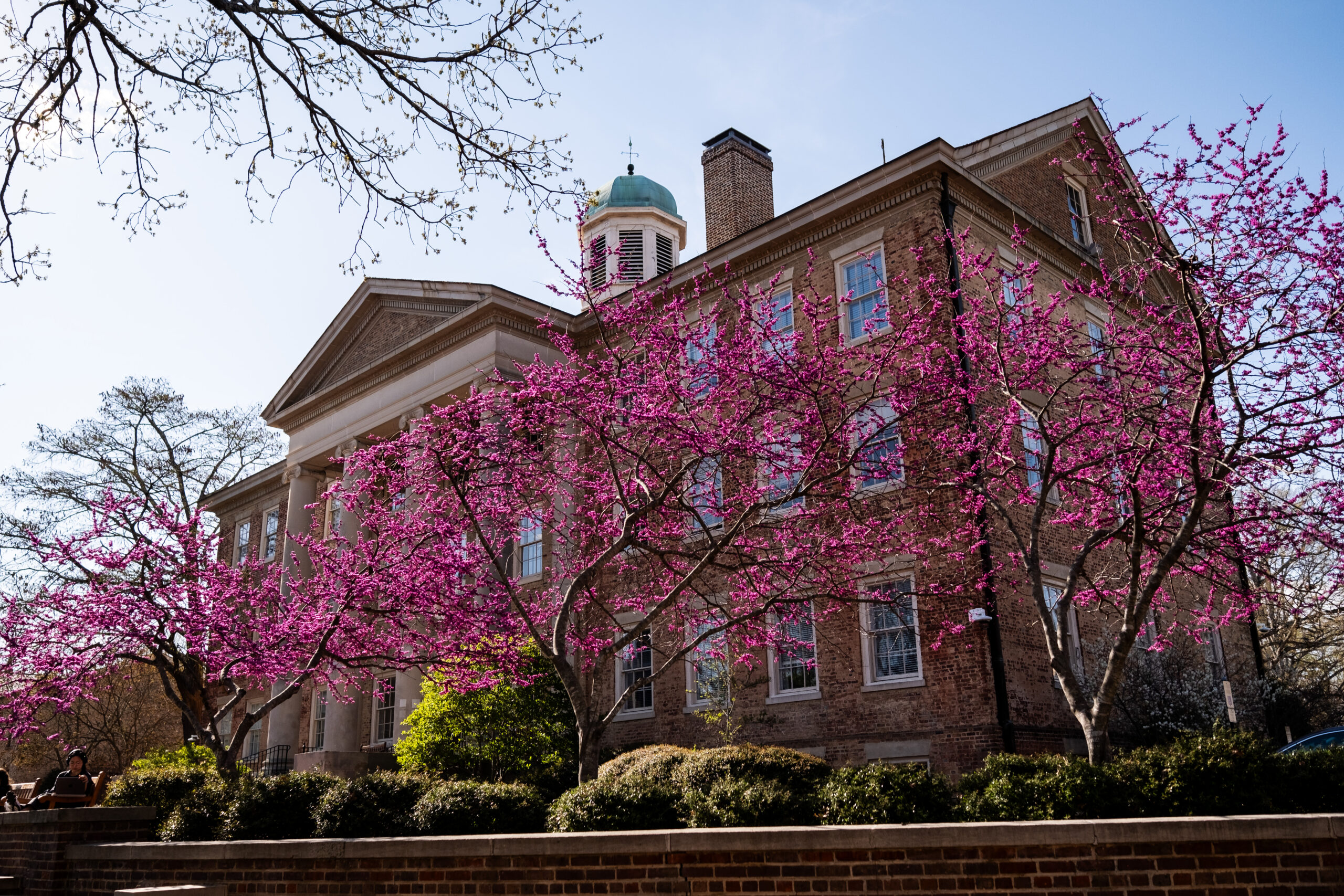
Peter Hans delivering his Food for Thought talk at the Morehead-Cain Foundation on January 19. (Photo by Aayas Joshi ’26)
Today’s guest is Peter Hans, president of the University of North Carolina system and a Food for Thought speaker at Morehead-Cain.
On this episode, President Hans shares about how growing up in rural North Carolina has informed his work, his experiences as president of the North Carolina Community College System, and his perspective on the future of affordable public education in the state.
Hans received his bachelor’s in political science from UNC–Chapel Hill and a master’s of liberal arts in extension studies from Harvard.
The president served as the first Food for Thought speaker of the spring semester. He spoke with Allyson Horst ’27 of the Scholar Media Team after his talk with scholars at the Foundation on January 19.
Modeled after the City Club of Cleveland, Food for Thought provides a central meeting place for members of diverse beliefs and opinions to participate in free and open discussions. The breakfast and conversation series is an initiative of Team Cleveland members from the 2022 Morehead-Cain Civic Collaboration program.
Music credits
The episode’s intro song is by scholar Scott Hallyburton ’22, guitarist of the band South of the Soul.
How to listen
On your mobile device, you can listen and subscribe to Catalyze on Apple Podcasts or Spotify. For any other podcast app, you can find the show using our RSS feed.
Catalyze is hosted and produced by Sarah O’Carroll for the Morehead-Cain Foundation, home of the first merit scholarship program in the United States and located at the University of North Carolina at Chapel Hill. You can let us know what you thought of the episode by finding us on Twitter or Instagram at @moreheadcain or you can email us at communications@moreheadcain.org.
Episode transcription
(Allyson)
President Hans, thank you for joining us today.
(Peter)
Thank you for having me.
(Allyson)
I enjoyed listening to your presentation this morning about polarization within higher education. What else do you hope scholars got out of your talk today?
(Peter)
Well, I was impressed, given the early time, that everybody stayed awake, was actively engaged, and had great questions for me. I think we covered a lot of ground. I was so impressed, as I always am, with Morehead scholars, their passion, their earnestness, their curiosity, and their potential. As I said to the group, I think the Morehead-Cain Program instills this obligation in public service in looking after Carolina and elevates their time in college to a whole different level. And so it’s just great to spend time with all these wonderful young people.
(Allyson)
Yeah. And you were talking to us today. You said you are from a very small North Carolina town, and how does being a North Carolina native help you to gain perspective about students and the overall UNC system?
(Peter)
Yeah. And let me define small town for you. I normally say I’m from Hendersonville because people sometimes have an idea where that is, near Asheville. But I’m really from a crossroads called Horseshoe, which, we’re now up to two blinking lights. It’s a few hundred people in the general community. And when I first came to Chapel Hill, it was a little bit of a culture shock because you’re here with 30,000 students. I’d never been away to camp. I didn’t know what was going on. And it turned out to be a wonderful, wonderful experience. But at first, I was sort of overwhelmed.
But having a sense of North Carolina, having lived in both on the coast and in the mountains, having spent nearly my whole life here, other than five years in Washington and grad school up north, that I’ve got a deep sense of this place. I love every nook and cranny of North Carolina. I love to play the game with people, stump me about where you’re from and where your family’s from and this sort of thing. I don’t always get it right, but most times I do. Because the University of North Carolina at Chapel Hill certainly exists, because it is a global public research university, exists for a much wider audience, but the majority of the benefits and, of course, the funding come from the people of North Carolina. And I think that’s very special. North Carolina is extremely fortunate to have this place in our state.
(Allyson)
Yeah. And you’re a first-generation college student. And so coming to UNC-Chapel Hill for your undergrad, what were some obstacles that you faced, even though you did find comfort being a North Carolina native?
(Peter)
Well, the first obstacle was failing math class first semester. That was never my strongest subject, to begin with, and yet a requirement. And I didn’t come from the strongest background, math background in my high school, although that wasn’t to blame. My mind doesn’t always connect with these conceptual things in trigonometry, calculus, et cetera. So that was a challenge for me. I think my GPA that first semester was a two-five or something like this, and I was a little bit worried about would I find my people, would I find friends, would I find interests, when I was struggling just with the classes, and the absorption into this much larger community. But it didn’t really take long, by second semester and certainly by second year, to make lots of friends and to find professors who took an interest in me and studying things that I understood better than math, and I began to just love the place. And it was a wonderful journey, just four amazing years, and now actually living on campus in the president’s residence. It’s just very special to be back.
(Allyson)
And you’ve been in higher education for most all of your career, correct?
(Peter)
Six years on the State Board of Community Colleges, and then, of course, I became president of the community colleges. Twelve years on the Board of Governors and now almost four years as president of the University System. So some of those were volunteer roles, others, of course, primary responsibility for the community colleges and the universities. I didn’t set out to become president of the University when I was a young person. That didn’t cross my mind that that was somehow a career path or job option. I don’t know how it all transpired, but I hope it’s for the greater good. It’s certainly my joy and privilege to serve.
(Allyson)
So there was not a point of inspiration where you’re like, I’m going to enter higher education, or was there just like a light bulb moment that you’re just like, I’m going to do this?
(Peter)
Well, I took a great interest during my time at Carolina as an undergrad in both North Carolina and the University, and that’s clearly where it emanated. So, I knew I was going to be involved with public policy in some sense, but it was some years before higher education evolved as the natural path, and I’m so glad it did. I feel as though we can help more people in higher education than just about any other sector.
(Allyson)
Yeah. And in your tenure as president of the North Carolina Community College System, you accomplished significant advancements in enrollment rates, public funding, and cross sector collaboration. So, what lessons did you learn from that career that you can apply to your position today?
(Peter)
So, in the case of the community colleges, it was telling their story better. It’s often frustrated me that there is a stigma around community colleges when community colleges ought to be celebrated. They’re amazing places for all sorts of people, whether they’re looking to transfer to a four-year institution, whether they’re trying to learn a trade or a skill, or they’re looking for a second chance to help themselves, provide for themselves, even provide basic skills, including literacy. So community colleges are asked to do a whole lot of things, and their story gets confused or somehow looked down on, and that drives me crazy. So we were able to tell the story of community colleges, I think, more effectively, and thus attract more people to take advantage of those programs that they offer.
(Allyson)
And on that same note, you have a lot of initiatives regarding adult learners. I’m assuming that applies specifically to community colleges. And so how does your initiatives differ from that of different states? I’m from Florida. I’ve never heard of these initiatives before so I thought that was quite interesting. So if you want to speak upon that?
(Peter)
Yes, absolutely. So, particularly as it relates to the University, we have had such a steady stream of 18 to 24-year-olds coming to the UNC System. And this is a result of North Carolina’s population growing and the affordability and accessibility of the UNC System. Well, the demographics tell us that the traditional college-age-going demographic, again, 18 to 24-year-olds, is plateauing and is going to turn down. So that’s not my theory. That’s the birth rate. That’s a fact. We can see this coming at the same time, because we had so many young people coming through the system, we really neglected adult learners in North Carolina who then turned to out-of-state for profit providers, in terms of achieving a four year degree. And they offer a much higher cost, lower quality alternative to the UNC System. But you’re an adult student, you’re juggling life, family, work, you know, all these things. You’re not a typical college student who’s coming to have a residential experience at Chapel Hill. So we’ve got to reach that group in a different way, in a more flexible way, in a more adult-friendly way, because they are not necessarily able to come to a college campus. So it’s got to be high-quality, personalized online learning experiences. But most people don’t have all the answers about what they want to do with their life at a young age. They need those opportunities, and the UNC System needs to provide those opportunities to adults throughout their lives.
(Allyson)
Yeah. And on that same note of accessibility, UNC at Chapel Hill has recently adopted an initiative where if you come from a family of a family making less than $80,000 per year, you will pay $0 in tuition. I believe that was adopted, what, in October. Why was that number, $80,000, just like that number, why was that chosen? That’s what I was really interested in.
(Peter)
Well, I believe the intent is to raise it as far as is feasible, given the resources, because you’re cobbling together federal support, state support, and private support. So I wholeheartedly endorse that because it’s critical that public higher education be accessible and affordable and that cost not be a barrier. We know nationwide that confidence in higher education is actually declining because of the national narrative about the cost of higher education. And I don’t want that to be the case here in North Carolina. We’ve held tuition flat for in-state undergraduates eight years in a row. And I’m very proud of that because, again, I believe in accessibility, I believe in affordability, I believe in equality. And those have got to be the hallmarks of the UNC System.
(Allyson)
And then speaking of flat-rate tuition, so how do you foresee that in the future being sustainable, especially with the current economic crisis that is today?
(Peter)
Yeah, well, great question. I would like to see us get to a decade of no tuition increases. I think we will do so. But you’re correct. The inflationary pressures of providing that education are ever-present, and we’re trying to balance those two that are in some tension.
(Allyson)
Moving on to more life lessons, key takeaways. So, you’ve spoken previously of a nonlinear path to success in previous interviews. What has your own path to success taught you in life?
(Peter)
I think to be open to new things, new people, new ideas, new opportunities. There’s an old saying that God laughs at our plans, and I have found that to be true. We can make a great plan about all the things we’re going to do in life, and then life intervenes. So I think it’s good for people to develop particular expertise while they’re in college, but have a broad based education so they’re prepared for inevitable changes in the economy and technology and society and their own personal lives.
(Allyson)
And then today, you were talking to scholars about media consumption and lots of media going around and creating this polarization, so do you have any tips or things that you do to limit your media consumption today?
(Peter)
I have gone on a diet of news consumption because there is such a high volume through our phones, these addictive devices that we all carry around. And so much of it is misinformation, and it’s perplexing, that to limit the consumption of “news,” because a lot of it actually isn’t journalism, per se, it’s just content often designed to provoke conflict or provoke emotion, outrage. To limit that and to find meaning in so many other things outside of politics. Care about causes, but care about other people. Care about understanding who you are and what your place in the world is. Don’t make politics your identity.
(Allyson)
And my last question, I just have to, of course, ask you this since you are an alumnus of UNC, what is your favorite Carolina tradition or memory?
(Peter)
Oh, wow. I’ve got a lot. I’ve got a lot. As I said, it’s quite something to return to campus and live here. I am distraught about the closing of Ye Olde Waffle Shoppe on Franklin Street. You may not have gotten a chance to eat there. I ate there regularly, probably three, four times a week. And just so many good memories. Lots of things that happen on Franklin Street. I’m going to keep it PG for the purposes of this podcast, but Ye Olde Waffle Shoppe. I want to see Franklin Street revitalized so it’s a center of student life and activity. I think we’re making some progress in that sense, but it’s really the sense of community that I gained from my professors, from friends I made, from other classmates. It’s just a very special place, Chapel Hill.
(Allyson)
I’ve heard a lot of complaints about the Waffle House.
(Peter)
Have you?
(Allyson)
I have. There’s a big debate, actually, right now. I don’t know if you can include that in your presidency, but I think that should be a massive initiative, honestly.
(Peter)
Going to figure out a way to harness this energy so that we can reopen Ye Olde Waffle Shoppe.
(Allyson)
Some sort of private collaboration.
(Peter)
We need a greasy spoon right there to provide high-cholesterol breakfast and lunch.
(Allyson)
Of course. It’ll be so supportive for the community, truly. Thank you so much, President Hans, for joining us today. I really appreciate it.
(Peter)
Likewise.
(Allyson)
Thank you.


